Karate and Martial Arts FAQ
|

|
(The opinions in this FAQ are those of the webmaster, and do not necssarily
reflect any official position of West Los Angeles Karate School. They are
intended only as an aid to folks interested in the martial arts, not as a
set of definitive answers. The tone is meant to be slightly tongue in cheek,
and to be entertaining while trying to be frank.)
No (as of the time of this writing - we have in the past and could in the future).
We do not have separate classes for children (or for women), so everybody (men and
women of all ages) train together. We will take younger students when they are 15 years
old (with parent or guardian approval), as by then they have developed the self discipline, physical size,
and their bones and bodies have matured enough to train.
We would be happy to provide a recommendation for schools that do have
classes for children. Just contact us via e-mail or telephone, and let us
know.
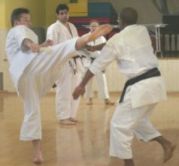
Karate involves defending oneself via blocking, and counterattacking
using punching, kicking and striking techniques. Power and speed are optimized
by employing correct body mechanics and alignment.
Particularly the employment of kicking techniques characterizes karate.
Typically, a student of karate
fights at kicking distance (as opposed to say punching distance or grappling
distances which are much closer).
Karate training is divided into three aspects: basics (kihon), sparring
(kumite) and forms (kata). Kihon entails the practice of the basics of stance,
blocking, punching, kicking, striking, moving and stance. Kumite involves
prearranged attacks and defenses at a lower level progressing to free sparring
(free exchange of techniques with a partner) at higher levels. Kata are the
prearranged sequences of defensive and offensive techniques that preserve and
encode our style.
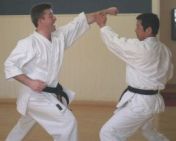
Classes range in length from a half an hour, an hour, and 1.5 hours.
Classes are held three times per week. We recommend attending two to
three classes per week (especially in the beginning) if possible, as much of
the learning is by rote and repetition in the beginning. But we also recognize
the importance of work and family, so set up your schedule as you can.
There is a philosophical aspect of karate-do (the way of karate) training
that is not spoken about much in our dojo (school, literally the place the way
is taught or pursued), but rather evinces itself in the way
the instructors and students interact with eachother. This is a subtle thing,
and highly individual. E.g., karate training can be utilized and viewed as a
way to "polish one's soul". In many dojos, this is actually given more formal
recognition through the regular recitation of dojo kun (precepts) and through a
more elaborate meditation ceremony at the beginning and end of class.

Possibly...
The founder of our style (Shotokan) of karate might say karate is for everyone, as he designed our
style to be accessible to everyone: men, women, children and seniors.
Personally, based on my experience and observations, I would say that karate is not for everybody. It
tends to appeal to those who have (or are trying to develop) a fair amount of
self discipline. While it can appeal to both goal oriented and process
oriented personality types, probably the process oriented folks tend to stay
around longer (i.e. achieve advanced rank). If you are seeking instant
gratification or easy answers, the answer is
definitely no. Karate takes a lot of diligence and sweat (and a decent
sense of humor helps!), and the difference
between success and failure is usually found in how regularly one attends and
how diligently they practice, as well as in cultivating an attitude that sees
success in terms of progress relative to oneself rather than as something
measured against the accomplishments of others.
If you've ever wanted to try karate or the martial arts, this is a great
opportunity to do so as it costs nothing but your time to try it.
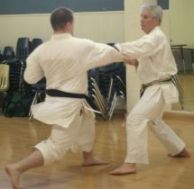
Well...
Our style of karate, Shotokan, is known for having strong basic techniques
and methodical training to that end with standardization and consistency across
the broad spectrum
of schools and organizations that practice our style (i.e. you should be able
to find a Shotokan school or club in almost any good sized city). It is a
"power" style (also said to be a "linear" style by outsiders), with an emphasis on
developing the power to quickly and effectively finish off an opponent. It is
also a "traditional" style, with standardized and traditional "forms" (aka kata) that preserve and
transmit the
style.
That being said, if you are just starting out in the martial arts, the style of karate (or
even martial art) is probably not as important as the quality of the school and
instructor(s). Since you will be spending a lot of time over potentially years
there, you want to make sure that both the instructor(s) and students are the
type of people you want to spend time with, and that they treat eachother with
respect. Also, that you get to go home with a full set of teeth every training session!
A beginner will probably not be able to discern that much about a particular
style of karate (or even martial art). It takes a while (I would say roughly a
year) to develop an eye for observing and beginning to understand what you are
seeing when you watch martial arts. If you decide later on that some other
style (or school) of karate or martial art would be more suited to your goals
you can change then. But make sure that first and foremost you pick a quality
school (and instructor(s))!
These are some offhand considerations and thoughts:
- No contracts: Payment should be on a month to month basis, with no long
term contract or payment such that you may quit at any time if you desire. If
they ask you to sign a contract, run (do not walk) to the nearest exit!
- Costs should be reasonable: Be sure that the dues structure is straight
forward, easily understood and readily available, and that the costs are in line with other
schools (or hopefully less!). All costs (including uniform, any organizational
fees, examination fees, any texts or manuals, etc.) should be clearly
delineated. Also, if you like you should be able to buy uniforms and
other supplies from a third party supplier, not just from the school you are
evaluating.
- Instructors and students treat eachother courteously and
respectfully: If
the instructor is abusive or overly militaristic (e.g. shouting at students in
a denigrating or derisive manner, or demanding tortuous exercises from
students) they are attempting to prey on your insecurities. Just politely
(but firmly) leave the premises.
- Training and exams open to all observers: You should be able to observe
all classes and exams without having to join up first. If not, they are trying
to hide something.
- You can speak freely to any of the instructors or students: If not, they
are trying to hide something.
- Instructor does not cop an attitude towards newcomers: If the instructor
acts evasively, strangely or mystically, they are a phony or head case, attempting to prey on your
insecurities or ignorance. You should be able to interact
with them off the training floor in a normal and friendly manner (e.g. as you
might with a parish priest, rabbi, minister, teacher, etc.).
- Look out for conmen and cults: If the instructor(s) or school attempts to
assert that their school goes way beyond teaching karate techniques and
philosophy or if there is an attempt to dominate one's social life (so that
they control your life outside of the karate school) politely but firmly leave.
Karate-do should enhance one's life, not become an obsessive end all. You
should have a fulfilling life outside of karate.
- They should answer all your questions: If they don't answer all of your
questions in a concise and clear manner, you won't understand their
instruction if you sign up to train there either.
- Free lesson with no strings attached: Many reputable schools will allow
you to take a class or lesson so you can evalute further whether this is the
school for you. DO NOT make any commitment long term when starting out!
The majority of novices decide karate is not for them after one to three lessons
(which is why we offer a week
(three lessons) free so you don't waste your
money figuring this out).

Ouch - yes.
If you train long enough, odds are you will be hurt at some point as in any
other athletic endeavor. The types of injuries we see most often include
blisters on the feet (from moving on the floor), sprains, muscle pulls,
bruises, tweaked backs and knees, et al.
If you train long enough to earn a
black belt, there is a good chance you will experience nearly all of these
joys, and possibly even more serious injuries such as a broken bone or problems
with the knee or
back.
Although we practice a non-contact ("point" sparring) style of karate, there
is still accidental and inadvertant contact. This is pretty much unavoidable
and in the nature of the martial arts although outside the scope of the
curriculum. I would say the injury potential is quantitatively and
qualitatively about
comparable to high impact aerobics or dance.
No, although we have considered (and continue to consider) such events.
Students are free to participate in any tournaments they would like, but we
do not require or pressure any students to do so. We do not want to develop a
situation where "more gifted" students (with respect to competition) are given
elevated status or attention.
Personally I believe that competition can be fun, and serve as both
motivation and as a way to meet others who enjoy the martial arts. However, it
is important that students do not become obsessed with winning and losing.
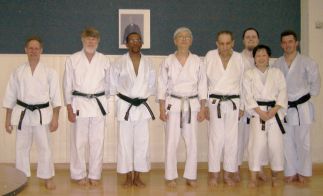
Most students never earn a black belt.
We do not guarantee that students will make black belt (or any other) rank.
Earning a black belt is a relatively rare occurence, although the primary
trait to be able to achieve black belt rank is simply the ability to show up for class
regularly, avoid serious injury and to train diligently.
Typically, it takes 5 to 7 years for most folks to earn black belt rank.
Theoretically this can be done in just 2.5 years given our testing schedule,
but I can recall only one person who was able to do this. We used to have a
rule of thumb of roughly one in a thousand (I sure better now) for the
odds of achieving black belt to give you an idea of how rare this is.
Consider how rare it is to train diligently and regularly at anything for 5
to 7 years. Conceptually that's not hard, but the reality is that it is not
often done. However, if you have the self discipline to do that, accomplishing this (or
anything else in life) is pretty straight forward!
The costs associated with taking karate are:
- Dues: You may try a week for
free with no strings attached.
After that, it is $50 per month (as of this writing) for 2 to 3 days of training per
week for beginning students ($65 per month for advanced students), which is
what we recommend for beginning students.
- Uniforms: Lightweight uniforms (which is what
we recommend for beginning students) are under $20 through us. You do not need
a uniform initially - you may train in loose fitting exercise clothing like gym
shorts or sweats. Heavier weight uniforms or other brands may run as high as
almost $200 (e.g. if imported) depending upon the make and model. The heavy
weight uniform that I (and a number of other students at our school) wear is
under $40.
- Rank examinations: $5 and given every three months for ranks under black belt. They are $10
for given every six months for black belt ranks. You only need to take
examinations when you feel ready to advance in rank.
So theoretically if you
passed every exam (which virtually noone does) it would cost $50 in total examination fees
over 2.5 years to get to black belt, $1680 in dues (18 months * $50 per month +
$65 per month for 12 months) and say about $35 in uniform costs for a grand
total of $1715 from beginner to black belt over 2.5 years. Cheaper than say
windsurfing (not close if you count the van and vacations at destination
windsurfing resorts) but more expensive than surfing (assuming no destination
resort vacations and not counting the cost of
gasoline in any of these!)...
Come to the first class of any given day about 10 to 15 minutes prior to
class start time. Wear loose fitting exercise clothing like gym shorts or
sweats. We'll have you read and sign a standard athletic waiver form and fill
out an information sheet. An assistant instructor will work with you one on
one for the first couple of lessons until you can follow along with the regular
class.
The class schedule, directions to the school and
parking are elsewhere on
this website.
If you can, let us know when you are coming down, and we'll make sure that
the instructor knows to watch for you. Otherwise, just show up.
The toughest step in karate training is stepping across the dojo (school)
threshhold the first time. After that, it's just showing up regularly. If
you've actually read this far, you might as well give it a try - you're certainly
interested!
We hope you'll take that first step!
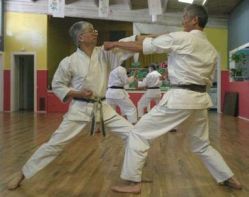
I'm the webmaster of this site and as such (and like any other webmaster)
can say pretty much anything I like!
I've been a member of West Los Angeles Karate School for some number of
decades now. I am currently a student, instructor and administrator there. I
have never been a champion of any kind (that's me being scored upon in the photo to the right), and do not consider myself
particularly talented at the martial arts. I do enjoy helping folks find
their way on (and sometimes off of) the martial arts path, as I recall how
exciting, beneficial and fun it has been for me. Seeing folks progress and succeed
at something they have always wanted to do is quite rewarding.
Other than that and perhaps a tendency to be a bit too opinionated, no particular qualifications. The value of all
of this might be exactly what you paid for
it... ;>)
Please note that there are a number of
FAQs and articles on the
Internet designed to help newcomers figure out which way is up - don't hesitate
to use your browser to find and use these! E.g.:
A lot of time and thought has been put into these with the intent of helping YOU! If you come across any other good ones, please let us know so we can add them to this FAQ.
If you have any comments, questions, corrections, or additional topics that should be
covered in this FAQ, please let us know via
e-mail or telephone!
 You can contact us at any time with any questions at:
You can contact us at any time with any questions at:
- E-mail: help@WLAkarate.com
- Telephone: (310) 737-7890
- Mailing address: PO Box 641691, Los Angeles, CA 90064
Please feel free to drop by and visit us during class hours.
Classes are held at the:
- Brentwood Youth House *
- 731 South Bundy Drive
- Los Angeles, CA 90049
* "The West Los Angeles Karate School is neither sponsored by nor is it in any way
connected with the YMCA of Metropolitan Los Angeles or the Los Angeles Unified
School District."
For further information, comments and questions you may also send e-mail to help@WLAkarate.com.
Copyright © Stan Uno.
"The ultimate aim of Karate-do lies not in the concern for victory or defeat,
but in the perfection of the human character of its participants."
|
|
Gichin Funakoshi
|








 You can contact us at any time with any questions at:
You can contact us at any time with any questions at: